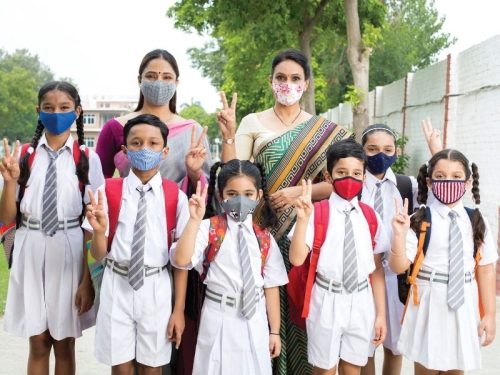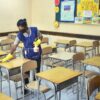No products in the cart.
Readying children for on-campus school
ParentsWorld interviewed some of the country’s most knowledgeable educationists and healthcare professionals to advise how best parents can prepare and support children to resume in-person schooling at a time when education institutions and society are obliged to live with the Coronavirus until herd immunity is attained, writes Aurelin Ruth, Mini P. & Cynthia John
Last month (August), after 62 weeks of lockdown of all education institutions across the country — the longest education moratorium worldwide — ten state governments issued tentative orders to restart middle and secondary school on-campus classes subject to strict adherence to anti-Covid safety protocols. Meanwhile, this knee-jerk lockdown of preschools-class XII institutions, to check spread of the novel Coronavirus, has imposed heavy loss of learning on the country’s 300 million preschool and primary school children in particular.
While a few thousand well-resourced private schools have responded to the pandemic challenge by switching to online learning-from-home classes for their students from elite and upper middle class homes, with a mere 8 percent of Indian households able to afford Internet connectivity and digital devices, learning has stopped for the majority of India’s 260 million children and youth in primary-secondary education, especially in rural India. An Emergency Report on School Education based on a nationwide School Children’s Online and Offline Learning (SCHOOL) survey led by eminent economist Jean Dreze, says only 24 percent of urban children and 8 percent of rural children countrywide were able to attend online school regularly over the past 16 months.
Another authoritative field research study titled Loss of Learning During the Pandemic, published by the Bengaluru-based Azim Premji University (APU), states: “Overall loss of learning is going to lead to a cumulative loss over the years, impacting not only the academic performance of children in their school years but also their adult lives”. The APU study says that “92 percent of children on average have lost at least one specific language ability… and 82 percent of children in classes II-VI have lost at least one specific mathematical ability learned in the previous year.”
Moreover, with 200 million children enrolled in 1.6 million government-run anganwadis and 1.2 million government primary schools deprived of early childhood nutrition and the mid-day meal provided to them, pervasive child malnutrition poses danger of brain damage and stunting to millions of children. The India Child Well-being Report 2020, published last November by World Vision India, a Chennai-based NGO, says the pandemic has placed 115 million children at risk of severe malnutrition.

A major factor in prompting the belated awakening of state governments to whom the buck of restarting on-campus classes has been passed in recent weeks after the BJP/NDA government at the Centre ordered a national lockdown of all education institutions countrywide for over 16 weeks from March 25, 2020, was a detailed cover story titled ‘Why Schools Should Reopen Right Now’ in EducationWorld (July), an affiliated print and online magazine of ParentsWorld.
In the unprecedented 10-page long-form feature, EW editors highlighted the huge loss of learning suffered by the great majority of the world’s largest child and youth population disconnected with the Internet and the new ICT (information communication technologies) world. This sui generis magazine which interviewed the country’s most respected educationists warned of millions of children discontinuing education and losing socio-economic upward mobility and substantial industry, agriculture and services sector productivity in the years ahead (see https://www.educationworld.in/why-india’s-schools-should-reopen-right-now/)
This warning was endorsed by Unicef (United Nations Children Fund, estb.1946) on July 21: “The losses that children and young people will incur from not being in school may never be recouped. From learning loss, mental distress, exposure to violence and abuse, to missed school-based meals and vaccinations or reduced development of social skills, the consequences for children will be felt in their academic achievement and societal engagement as well as physical and mental health. The most affected are often children in low-resource settings who do not have access to remote learning tools, and youngest children who are at key developmental stages. The losses for parents and caretakers are equally heavy. Keeping children at home is forcing parents around the world to leave their jobs, especially in countries with no or limited family leave policies. That’s why reopening schools for in-person learning cannot wait.”
The 62-weeks lockdown of schools countrywide has dismayed even upper middle class professionals who have the wherewithal and ICT connectivity to ensure that their children can continue to learn online. Comments Shabnum Nishat, a Bengaluru-based IT professional, whose daughter Nusrat Fathima (10) has called a “strike against online learning” for the past month. “My daughter was an energetic, bubbly child. But forced to stay home for the past 16 months, and unable to meet her friends in school, her mental health has deteriorated progressively. She throws tantrums and has become quiet, withdrawn and anxious. On a friend’s advice, I’ve enrolled her in a sports centre. It’s been only two weeks, and already we are seeing an improvement. I believe it’s time we reopened schools for all sections — pre-primary to higher secondary — with adequate safety protocols, and gave our children their childhood back,” says Nishat.
Yet despite evidence indicating the numerous ill-effects of prolonged online schooling, a large number of elite and middle class households prefer to be safe than sorry. A recent survey conducted by LocalCircles, a social network, found that 62 percent of urban parents don’t want to send their children to school even if they are reopened on government orders.
Poor student attendance in the few states that have permitted on-campus classes is indicative of parental reluctance to send children back to school. With most state governments mandating parental consent letters, and ordering schools to provide the online schooling option, most urban middle class parents are withholding consent forms, opting for continuation of online classes. For instance in Karnataka, when schools reopened for classes VI-XII in August, student attendance ranged between 40-50 percent. Moreover, most private schools in Bengaluru city refused to reopen citing parent reluctance to send children to on-campus classes.

However, it’s pertinent to note that parental hesitation to restart on-campus, in-person education of their children is essentially an urban middle and elite class phenomenon. According to a study by Maharashtra’s SCERT (State Council of Education Research & Training), 80 percent of bottom-of-pyramid urban and rural households in India’s most industrialised state believe their children will be safer in school — where they are also provided a free-of-charge mid-day meal — than in their overcrowded slum and rural homes.
Nevertheless, the tide of expert opinion is turning in favour of all children including learners from digitally connected homes restarting in-person schooling following the over-long national lockdown. ParentsWorld interviewed some of the country’s most knowledgeable educationists and healthcare professionals to advise how best parents can prepare and support children to resume in-person schooling at a time when education institutions and society are obliged to live with the Coronavirus until herd immunity is attained. According to these experts, responsible parents need to bear in mind that:
Children are at low-risk of contracting Covid-19
The Indian Association of Preventive and Social Medicine (IAPSM), a group of 6,000 allopathy doctors from 550 medical colleges countrywide, recently (August) reviewed scientific data relating to children and Covid-19. They concluded that the majority of children infected with the Coronavirus manifest only mild symptoms, and that the benefits of reopening schools far outweigh the risk to their safety.
“Due to the Covid-19 pandemic, a major chunk of our population has been deprived of education, and there is virtually no education in rural areas due to the big digital divide. The growth and development of millions of children and their nutritional status from preschool to higher classes has been compromised.
The benefits of opening schools far outweigh the risk of SARS-CoV-2 infection,” says Suneela Garg, president of IAPSM, in a formal statement.

Adds Dr. Swati Popat Vats, founder-president of the Early Childhood Association, which has 38,000 member preschools across the country: “Numerous studies indicate that children are at low risk of Covid-19 infection. Yet most state governments haven’t allowed reopening of pre-primary and primary schools. Early childhood is the most important period in an individual’s life span given that 90 percent of the brain develops in the first eight years of life. During this critical period, if children don’t receive professionally administered early childhood care and education, they will grow up with damaging learning deficits. We need to urgently reopen all pre-primary and primary schools with adequate safeguards. We cannot deprive children of the cognitive, social, emotional and language stimulation they need in early years to develop into competent, well-balanced adults.”
Children’s vaccination is not necessary for reopening schools
Schools have reopened in more than 175 countries worldwide, without any nation vaccinating children below 12 years of age. They have made vaccination of parents and teachers the top priority.
Even as some parents are campaigning on social media that children’s vaccination should be a precondition of reopening schools, the consensus among medical experts is that children’s vaccination is not necessary to restart on-campus classes.
“There is no requirement for teenagers or kids to have to be vaccinated in order to attend school. That should not be a barrier for them to attend school. It’s about the protection of the adults around them, who are the ones who really have more risk of disease,” says Dr. Katherine O’Brien, a member of the WHO Covid-expert committee, in a statement released on August 4.
Health professionals and experts familiar with India’s ground conditions agree. “The current global evidence and expert consensus is that vaccination of children is not a prerequisite of reopening schools. This is not to say that children should not be considered for vaccination; however, with them being at the lowest risk of severe disease and 60-80 percent of them (in India) already having developed antibodies, the benefit of vaccination of kids is far lower than that for adult age groups,” opined Chandrakant Lahariya, a public health expert and co-author of Till We Win: India’s Fight Against The Covid-19 Pandemic (2020) in an op-ed-page essay in the mass-circulation (Times of India, August 1).
Quite correctly, state governments and sentient private schools managements countrywide have made vaccination of their teachers and staff top priority. According to the Union education ministry, 80 percent of teachers and staff employed in schools across the country have received the first dose of Covid-19 vaccine. The ministry has asked all states and Union territories to complete first dose vaccination of all teaching and non-teaching staff by end September.
Moreover, 50 percent of India’s adult population (18+) — 541 million citizens — have received the first dose and another 165 million have received both doses thus reducing the risk of dissemination of the dread virus.
Benefits of in-school education far outweigh online learning
According to a recent report of the Parliamentary standing committee on education, “online education is not real education”. Similarly another study (November 2020) conducted by the Bengaluru-based Azim Premji University on remote learning which surveyed 1,522 schools and 80,000 students countrywide, says that online education is “ineffective and inadequate towards (sic) a child’s development.”
“Online education is ineffective because of the basic character of education… education requires physical presence, attention, thought and emotions, all to be seen towards learning goals, step by step, often back and forth, and differently for each student. This requires intense verbal and non-verbal interactions amongst teachers and students, which is possible only in actual classes,” said Anurag Behar, vice chancellor, Azim Premji University, while releasing the study.

Adds Veni Sukumar, head of education, Samsidh Group of Schools, Bangalore: “Children need human interaction to blossom into healthy well-balanced adults. In most schools, teachers have taken both doses of vaccination and all protocols about social distancing and sanitisation are being followed. It’s time we reopened schools for all classes.”
Schools boost children’s physical health
Schooling is not entirely academics. It provides children the opportunity — in most cases the only opportunity — to play sports and games. With education institutions under lockdown for over 16 months, the majority of India’s children have not participated in any sports activity and/or physical education. Unsurprisingly, there’s an alarming rise in the number of obesity cases among children over the past year.

“The pandemic has brought the importance of physical fitness into sharp focus. Unfortunately during the lockdown, most children have had no sports and physical activity. This had taken a toll in terms of stamina, strength and agility of children. School is where most children especially the youngest, start playing sports. We need to get our children back in school and on playing fields,” says Vaidehi Vaidya, a former national/state level footballer and founder of Women in Sports, India, Pune.
On-campus education enhances children’s mental health
The pandemic lockdown has also played havoc with children’s mental and emotional well-being. Some research studies estimate that two of five children are exhibiting symptoms of hyperactivity and sensory malfunction as a consequence of forced home confinement and online learning. The number of children with high anxiety and depression is also rising continuously.
“Prolonged home confinement has sharply increased the number of children suffering psychological problems including depression, anxiety and stress. Most children who consult me are stressed because of online classes and constant pressure to complete assignments. Parents and teachers need to address and repair the mental, psychological and emotional damage children have suffered by creating welcoming, non-threatening teaching-learning environments. Over the next few months, the mental and emotional well-being of children must take precedence as it’s the prerequisite of academic learning and success,” says Dr. Anju Soni, psychologist and mental health counsellor, Chennai National Hospital.
Maintain a balanced perspective
The leading causes of child mortality are birth complications, diarrhoea, and acute respiratory infections (such as pneumonia). Diarrhoea and pneumonia kill an estimated 200,000 children in India every year, according to the Pneumonia and Diarrhoea Progress Report Card 2019. Obesity and malnutrition are also causes of a large number of child fatalities. Relatively, only a small minority of children with comorbidities in India have succumbed to Covid-19 since the onset of the pandemic in November 2019.
According to the London-based weekly The Economist (June 26), arguably the world’s most widely read and authoritative news magazine, “Covid-19 rarely makes children very ill. In the year to April, the chance of an American aged 5-14 catching and dying from the virus was about one in 500,000 — roughly a tenth of a child’s chance of dying in a traffic accident in normal times.”
Therefore, parents need to carefully sift facts from fiction and weigh the cost-benefits of sending children back to school.
Support your children to return to school

As schools in India re-start in-person classes, children are likely to experience a range of emotions. Returning to school campuses and classrooms will be welcome and exciting for most students, but some children will experience anxiety and stress.
Unicef has prepared valuable guidelines to enable parents to support children returning to schools to manage complicated emotions and ease them into the new normal in school. Excerpts:
My child is worried about falling ill at school and doesn’t want to go back. What can I do?
• Have an open conversation with her about what’s worrying her and let her know that such hesitation and anxiety is normal.
• Talk to her calmly about some of the changes she could expect at school, such as the need to wear masks and following safe distancing rules. Reassure her that safety measures have been mandated to keep students and teachers healthy.
• Remind children about the positives — they will be able to meet their friends and teachers and continue learning new things.
Is there anything I should look out for as my child starts school?
As your child returns to school you should frequently monitor her physical health, learning, emotions and behaviour. Look out for the following signs of stress and anxiety to gauge if your child needs extra support from you.
• Melancholia
• Anxiety
• Anger
• Agitation
• Fatigue
• Confusion
• Lack of interest in playing with peers or completing homework
• Insomnia and eating disorders
Is there anything I should look out for as my child starts school?
As your child returns to school you should frequently monitor her physical health, learning, emotions and behaviour. Look out for the following signs of stress and anxiety to gauge if your child needs extra support from you.
• Melancholia
• Anxiety
• Anger
• Agitation
• Fatigue
• Confusion
• Lack of interest in playing with peers or completing homework
• Insomnia and eating disorders
• Loss of interest in hobbies and/or friends
My child’s behaviour has changed since she stopped going to school. She’s become withdrawn and won’t talk to me. I’m really worried about sending her back to school. Is there anyone who can help?
The pandemic, lockdown and schools closure have caused many children and young people — especially teenagers — to experience loneliness, isolation and stress. If your child is not open to talking to you, this doesn’t make you a bad parent. Call this child helpline 1098 (Open 24 hours. Calls are free.)
My child’s sleep pattern has changed during the lockdown and I’m worried about how she will cope when she resumes regular school.
Children’s sleep habits and quality of sleep are likely to change during lockdown. Some ways to remedy this:
• Get your child back into the routine of waking earlier before normal schooling begins.
• Don’t let her nap during the day. Avoid digital screen time after waking and at least an hour before going to bed. Develop a routine and stick to it.
• The day before she goes back to school, have a calm evening, with plenty of time for settling and preparation.
My child has struggled to study from home and is worried about being very far behind classmates. How can I help and reassure her?
Many children have struggled to continue learning during the lockdown. As they return to school, they are likely to be fearful about facing learning deficits, especially in comparison with other children. During this time, it’s important that parents prioritise their children’s well-being and adjustment to the new normal over learning outcomes. When children feel loved and supported, they learn better. You could also talk to your child’s teacher about the support systems instituted by the school to help children who have fallen behind during lockdown.
I’m anxious about being away from my children when they go back to school. What can I do to calm down?
Parents have become accustomed to having their children around them all the time during lockdown. And the thought of being separated from them as they return to school, is likely to cause stress and anxiety. Children are very sensitive to the emotions of their parents. Therefore, it’s important that you take care of your own mental health, as well as theirs. Here are some tips for managing your stress.
• Maintain a healthy lifestyle. Follow a balanced diet, get enough sleep, and exercise.
• Remain connected with your loved ones and make time for activities that you enjoy as a family.
• Talk to people you trust, including friends and family.
• Don’t smoke, drink alcohol or take to drugs to deal with your emotions.
• Gather Covid-19 information that will enable you to take reasonable precautions. Find a credible source of information you can trust such as a local or state public health agency, WHO, UN agencies.
• Draw on skills that you have successfully used in the past to manage adversities and use them to help you manage this challenging time.
• Get physical and mental health support if needed.
Source: Unicef, August 2021
















Add comment